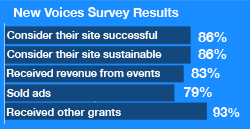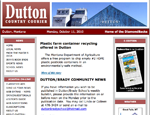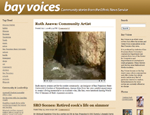We are extremely proud of what these five classes of New Voices grantees have accomplished. And we are even prouder to have watched them adapt to their realities in ways that demonstrate the sustainability of their aspirations.
Kudos to the three sites that stalled and then revived: BayVoices’s Ethnic News Service, Girls on Air podcasts and Appalshop’s Community Correspondents Corps. It shows that they believe there is an audience for their work.
Hats off to Greater Fulton News and the Dutton Country Courier for generating enough respect that their universities could hand off the sites to others in the community. A pat on the back for the spin-off of Great Lakes Wiki into the more robust Great Lakes Echo. Cheers for Madison Commons’ re-birth as a site not so reliant on citizen journalists.
And a big applause for all the sites that doggedly figured out — and are still figuring out — how to do what they want to do. There is still much work to be done.
In some instances, J-Lab intervened in hands-on ways. We liberated projects to move forward where they could. We urged more realistic content plans when sites were stalled. We offered editing suggestions for complex issues papers. We brokered a new marriage, finding a new publishing platform when the original partner shut down.
 In March 2010, J-Lab surveyed the New Voices grantees to elicit additional feedback on their projects. Twenty-nine of the 46 projects responded. More than three-quarters of the respondents said they considered their projects to be both successful and sustainable. And a large majority said they had brought in other revenue through advertising, events or other grants.In some instances, J-Lab intervened in hands-on ways. We liberated projects to move forward where they could. We urged more realistic content plans when sites were stalled. We offered editing suggestions for complex issues papers. We brokered a new marriage, finding a new publishing platform when the original partner shut down.
In March 2010, J-Lab surveyed the New Voices grantees to elicit additional feedback on their projects. Twenty-nine of the 46 projects responded. More than three-quarters of the respondents said they considered their projects to be both successful and sustainable. And a large majority said they had brought in other revenue through advertising, events or other grants.In some instances, J-Lab intervened in hands-on ways. We liberated projects to move forward where they could. We urged more realistic content plans when sites were stalled. We offered editing suggestions for complex issues papers. We brokered a new marriage, finding a new publishing platform when the original partner shut down.
Changing the Rules
As these sites have adapted, so has J-Lab changed some of the rules of the road. We adjusted the baseline requirements in our annual Request for Proposals so that we:
- Required all projects, whether print or broadcast or cable, to have a web presence so stories could be seen by others who wanted to learn from them.
- Required university projects to commit to year-round content development instead of just producing stories during the academic semesters.
- Discouraged projects that focused on youth media training instead of producing community news.
- Pressed for a two-year grant commitment, seeking grantees who wanted to go for the second-year matching funds.
- Sought assurances that project leaders would be around for the full two years of the grant.
- Probed for whether projects leaders had, or could access, the tech skills they would need.
- Redrafted university sub-grant agreements to accommodate various university requests.
Perhaps more important, we came to learn that we were not just mentoring community news projects. We were also mentoring fledgling nonprofit news sites. Many of the grantees had little experience in applying for or managing grants. The idea of delivering progress reports, collecting metrics for their projects and tracking impact was a steep learning curve for some.
[blockquote]We came to learn that we were not just mentoring community news projects. We were also mentoring fledgling nonprofit news sites.[/blockquote]
As important, the projects learned from one another. “While we are deeply grateful for the Knight Foundation funding, it has been the work of the other winners that has really spurred us into action,” said 10 Valley founder Jon Beaupre.
New Voices was deliberately designed only to provide micro-funding that could be leveraged to secure more support. In no case did the grantees resent the level of funding. But, operating with skeleton resources, they found they needed the two-year grant cycle just to focus on building their sites, getting fresh content, and building their corps of contributors. Figuring out future support is next on many agendas.
“When you fly a plane with little fuel, it really focuses you on your destination,” said Joe Murray, Stories That Fly founder. “So, congratulations to Knight for not giving us enough money.”




